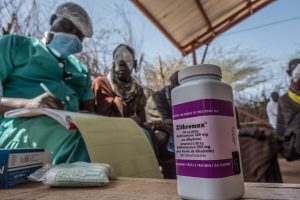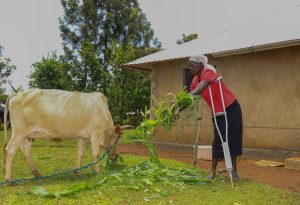Join a powerful, unprecedented alliance for better eye health for all.
Join IAPB-
Choose an alternate language here
Sightsavers is an international NGO that was founded in the UK in 1950. When we opened our Kenya office in 1952, up to 7% of rural Kenyans were affected by blindness, and a further 2.5% were living with significant visual impairment. Our focus at the time was on reaching people in remote communities who needed cataract operations and other eye treatments.
Alongside this, we worked to make life easier for children and adults who were blind or visually impaired. Our office supported itinerant teachers who travelled between schools, helping young people with visual impairment to get an education. We also assisted visually impaired adults to resume their daily activities and learn new skills.
We were guided by our founder, Sir John Wilson, who lost his sight at a young age following an accident during a school chemistry lesson. He was a firm believer that people with visual impairment and other disabilities should be able to fulfil their true potential. In 1969, Sir John was involved in organising a ground-breaking expedition where a team of seven blind men from Kenya, Uganda and Tanzania succeeded in climbing Mount Kilimanjaro. The event was covered in newspapers across Africa, and it helped to challenge society’s negative perceptions towards people with a visual impairment.
The message of the young climbers was, “We have met fear and we have conquered it.” This resonates with Sightsavers’ constant endeavour to support people with disabilities to reach their potential and claim their rights – whether this is the right to go to school, to work, to access healthcare or to have their voices heard.
Over the decades that followed, Sightsavers focused on investing in facilities to improve the standard of eye care in Kenya. This included the construction of the Embu County Referral Hospital Eye Unit in the 1990s, the Kajiado County Referral Hospital Eye Unit in the 2000s, and other more recent clinical and teaching facilities in Marsabit and Nairobi.
We also supported the training of ophthalmologists and other clinical staff. In the mid-2000s we became one of the founding members of the College of Ophthalmology of Eastern, Central and Southern Africa (COECSA), an organisation that is responsible for improving standards in ophthalmology. One of COECSA’s programmes, ‘Promoting Quality Ophthalmology’, contributed to training 144 ophthalmologists across Kenya, Uganda and Tanzania. This extra capacity enabled hospitals to carry out thousands of patient examinations and eye operations.

Alongside our work on improving eye care, we turned our attention towards tackling neglected tropical diseases (NTDs). Two of these diseases, trachoma and river blindness, are among the leading causes of avoidable blindness around the world. Since the early 2000s we have worked with the Kenyan government and international partners to distribute millions of doses of medication to prevent against trachoma, river blindness and other NTDs. We have also supported thousands of eyelid operations operations to treat the painful effects of trachoma.
Our work in Kenya has taken on yet another dimension in recent years. Through our Inclusive Futures programme, we are working to create new opportunities for youth with disabilities. Our staff and partners are supporting people with disabilities to access healthcare, to pursue a career, and to make their voices heard in the political arena. Although this is a new step for us, it’s in keeping with the values of inclusivity and empowerment that we have always held.

I’m immensely proud of the work that has been achieved by Sightsavers Kenya over the past 70 years. Together with the government and other partners, we have been able to improve the lives of countless people. But we’re not done yet.
Over the next five years, we will continue to work on improving people’s access to eye health services in Kenya, while ensuring that no-one is left behind. We’re looking forward to working with the Ministry of Health to finalise a national eye health policy, and will be exploring ways to reach thousands of people who are living with uncorrected refractive error.
We are hoping to provide access to work for many more people with disabilities, through our large-scale Global Labor Program that is taking place in partnership with Kenya Breweries Ltd (KBL) and Coca-Cola Beverages Africa (Kenya).
Lastly, we are aiming to contribute to the elimination of trachoma as a public health problem in Kenya, an achievement that will help to protect millions of people from the threat of avoidable blindness.
We are looking forward to working productively with the government and people of Kenya on all of these activities, so that together we can make our country a healthier and happier place.